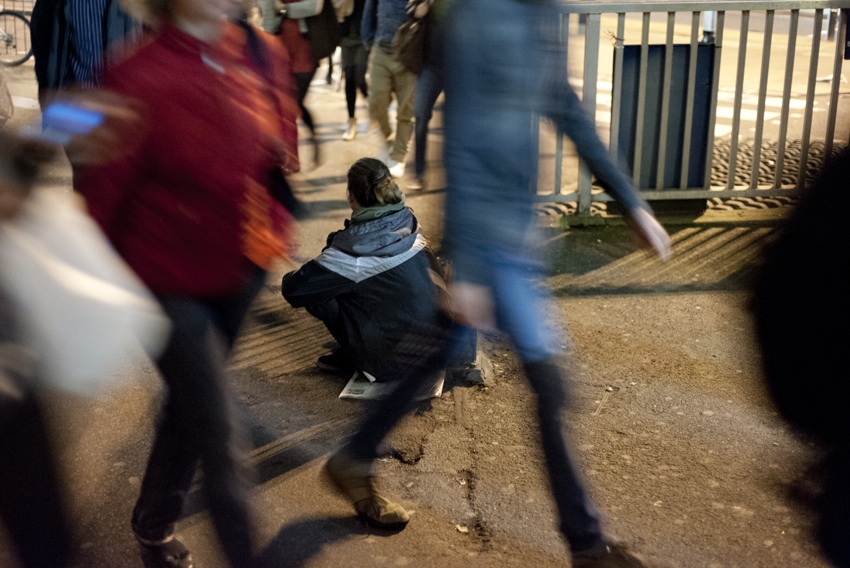Laws linking welfare entitlement to immigration status have been a major cause of street homelessness, but legal solutions alone will not end migrant destitution. Rough-sleeping services also need to win back the trust of non-UK nationals.
Before Covid-19, between a quarter and a third of the UK’s rough sleepers were estimated to be from a migrant background. In London, around half of street homeless people were non-UK nationals. Unsurprisingly, central London boroughs such as Westminster, Camden and Southwark had high rates of migrant homelessness. But there were also large numbers of street-homeless non-UK nationals in some outer London boroughs, including Hillingdon (where Heathrow Airport is located), Ealing and Redbridge, as well as in Manchester and the West Midlands.
Some non-UK national rough sleepers experience what the sector calls ‘multiple exclusion homelessness’, meaning their rough sleeping is linked to issues such as addiction or being a survivor of abuse. The longer a person is destitute, the more likely they are to fall into this category. But in the cases of most migrant rough sleepers, there is a clear link between the homeless person’s immigration status and their homelessness. Many are on the streets either because they are not allowed to work, because they cannot establish an entitlement to welfare benefits and statutory homelessness assistance, or through a combination of these two factors.
Migrant rough sleepers used to complain that homelessness services did not seem to understand the reasons for their homelessness or the kind of help they needed to get off the streets. They would report being offered substance-misuse treatment or employment support, despite not having drug or alcohol issues or the right to work. Services were often making the reflexive assumption that all rough sleepers had the same support needs.
In recent years the homelessness sector has wised up to the fact that migrant rough sleepers face different barriers to their UK-national counterparts when it comes to accessing accommodation. Many homeless migrants are not eligible for help with housing costs, so the standard model for accommodating rough sleepers – putting them in a hostel and claiming housing benefit to cover the provider’s costs – will not work for them. The sector’s growing recognition of the intertwinement of the UK’s immigration and welfare regimes has led to schemes aimed at addressing the specific issue of migrant rough sleeping.
But treating migrant rough sleepers differently has not always resulted in policies that uphold the human and social rights of homeless non-UK nationals. Instead of seeing insecure immigration status, or ‘no recourse to public funds’ (NRPF) status, as a ‘support need’, homelessness services – including councils and their commissioned outreach services – have tended to view the legal exclusion of some homeless people from statutory welfare support as an intractable barrier to housing-led solutions for this group. Instead of being challenged, ‘welfare chauvinism’ – the preferential treatment of citizens over non-citizens in the allocation of access to state support – has been taken as a given.
It was in this context that the government, along with some local authorities and charities, came to see deportations as a solution to migrant homelessness. According to a recent St. Mungo’s review into the charity’s work with the Home Office between 2010 and 2017, sharing information about rough sleepers for immigration-enforcement purposes was for many years ‘established good practice’ in the homelessness sector, with ‘joint operations’ between charity outreach workers and immigration officers seen as ‘useful tool to encourage people to take up an offer of accommodation or supported reconnection’.
After a judicial review challenge by PILC, the Home Office’s policy of deporting street-homeless EU citizens was ruled unlawful by the High Court in 2017. But the government has continued to explore ways of outsourcing immigration enforcement to local authorities and charities.
The Rough Sleeping Support Service (RSSS), announced as part of the government’s Rough Sleeping Strategy in 2018, was framed in public as a way of helping homeless migrants off the streets by obtaining immigration-status checks via a dedicated Home Office team. Internally, however, the service was described as ‘local authorities and their commissioned service providers carrying out a specific task in the public interest [i.e.] delivering immigration controls’.
After initially telling prospective partners that data sharing through the RSSS would take place only with the consent of rough sleepers, the Home Office backtracked, insisting that the service would operate on the basis of ‘public task’. This meant charities and councils could pass on homeless migrants’ information without their agreement and, potentially, without even informing them. This month, after PILC challenged the Home Office over their lack of a data protection framework for the RSSS, the RSSS was quietly relaunched, with the ‘public task’ element dropped in favour of a system based on ‘informed consent’.
The homelessness sector’s work with non-UK nationals is beset with problems of vision and expertise. Many homelessness workers lack the training to advise people with NRPF about their welfare entitlements. Local government is reluctant to fund immigration advice and specialist accommodation on a scale to match the problem of migrant destitution. But an equally important factor preventing migrant rough sleepers from getting the support they need is the mistrust felt by many homeless non-UK nationals towards agencies who claim to want to help them, but also have a history of working with the Home Office to deport them.
When Covid-19 hit, the homelessness minister directed local authorities to accommodate all homeless people, including those with NRPF. A new report, co-written by PILC, highlights the shortcomings of this response, including a lack of information for homeless migrants about how to access support and ‘gatekeeping’ by some councils. Our report concludes that MHCLG’s failure to properly fund or empower local authorities to accommodate people with NRPF has made it almost impossible for councils to do a proper job of supporting homeless migrants during the pandemic.
But the migrant-support organisations and homeless people we spoke to also cited a lack of trust in services as a major reason why some migrants struggled to access shelter during lockdown. One homeless EEA national said of the homelessness services working with him in his Covid-19 hotel: ‘If they could, they’d send us far, far away […] so that they wouldn’t have to see us ever again.’ Another client recently told PILC that he would give charity workers a wide berth when sleeping rough: ‘You’d be suspicious of the outreach teams. You’d be asking, why do you want my name, my ID? I knew a couple of people whose ID was retained and they disappeared. I assume they were sent back by immigration.’
These suspicions are neither unjustified nor necessarily outdated. During lockdown, we dealt with two cases in which housing officers from London councils informed homeless migrants with NRPF that, if accommodated, their personal data would be shared with the Home Office. The threats were withdrawn after PILC intervened, but one of the clients concerned was so worried that he changed his mind about asking the council for support. In a third case, a homelessness charity reported their client—a homeless person with insecure immigration status—to the police after he disclosed a minor historic criminal offence.
We have also been representing a seriously ill client whose personal information was shared with the Home Office through an ‘immigration surgery’ held on a charity’s premises. Our client, who was homeless at the time, did not realise that the ‘advisor’ he was speaking to was an immigration enforcement officer. Neither the Home Office nor the charity facilitating the ‘immigration surgery’ obtained written consent from the client for his data to be shared.
New rough sleepers, many of them migrants, continue to hit the streets of London and other UK cities every day. With the ‘Everyone In’ scheme no longer operational and outreach teams running reduced services due to the pandemic, it is harder than ever for newly-homeless people to find even a temporary route off the streets. Meanwhile, the fate of hundreds of NRPF rough sleepers housed in hotels through the Covid-19 homelessness response remains unclear, with MHCLG telling councils that ‘voluntary repatriation’ will be the best option for some.
Despite a recent wave of interest in migrant rough sleeping as a result of Covid-19, the problem of immigration status-based destitution is no closer to being resolved than it was before the pandemic. There is little chance of the government bowing to demands for the abolition of NRPF, while the new immigration bill and the end of Brexit transition period in December 2020 threaten to make life even more difficult for homeless and precariously housed migrants.
If homelessness services want to resist this trajectory and make inroads into the structural problem of migrant homelessness after Brexit and Covid-19, a vital first step will be to regain the trust of non-UK national rough sleepers. This will require culture change on the part of both councils and the charities they commission, including a commitment to the principle of housing—and data privacy—for all, regardless of immigration status.




